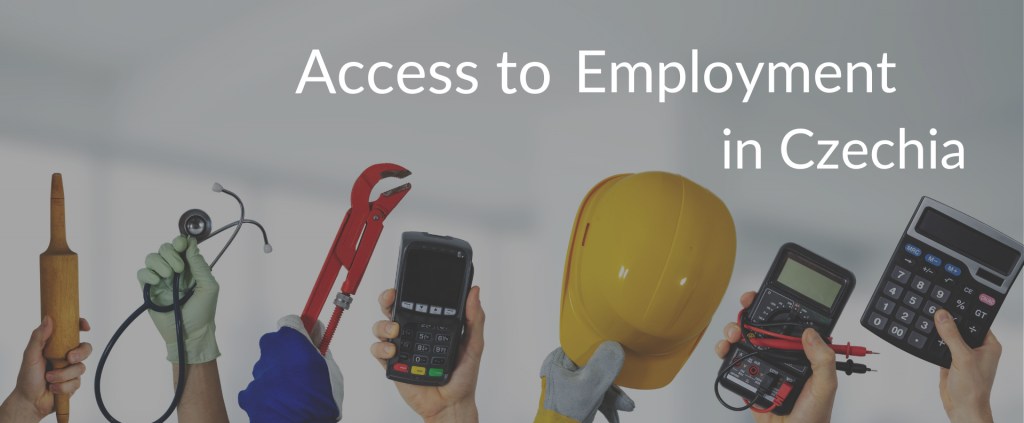Employment
Your Rights to Work Labour Office Online Tools For Ukrainians Need Help & Counselling? Tips to Stay Safe Problems at Work? Job Portals Requalification & Courses Coursera for Refugees

Employment is a key step in rebuilding your life in Czechia. The rules and conditions of access to the labour market can differ depending on your status — whether you are an asylum-seeker, a refugee, a stateless person or a beneficiary of temporary protection. Knowing your rights, using official services, and getting support from trusted organisations can help you find safe and fair work opportunities. This page explains what support is available to find a job, and how to protect yourself at work. It also provides links to official job portals, training opportunities, and organisations that can guide you step by step.
1. Registering with the Labour Office (Úřad práce ČR)
Your right to work depends on your legal status and type of residence permit in Czechia:
![]() Asylum-seekers. If you are an asylum-seeker, you can start working 6 months after your asylum application has been registered. However, you will need a work permit. A social worker can help you to apply for a work permit at a local Labour Office once you have a job offer.
Asylum-seekers. If you are an asylum-seeker, you can start working 6 months after your asylum application has been registered. However, you will need a work permit. A social worker can help you to apply for a work permit at a local Labour Office once you have a job offer. ![]() Registration with the Labour Office is mandatory if you want to use their services and benefits (job matching, requalification courses, allowances). You must register at your local Labour Office.
Registration with the Labour Office is mandatory if you want to use their services and benefits (job matching, requalification courses, allowances). You must register at your local Labour Office.
![]() Stateless persons or applicants. If you are a recognised stateless person in Czechia, you have the right to work under the same conditions as Czech citizens. If you have applied for stateless status, you may begin working 6 months after your application is registered.
Stateless persons or applicants. If you are a recognised stateless person in Czechia, you have the right to work under the same conditions as Czech citizens. If you have applied for stateless status, you may begin working 6 months after your application is registered.
![]() Recognised refugees and beneficiaries of subsidiary or temporary protection have free access to the labour market (no work permit required) under the same conditions as Czech citizens, with possibility to run a business or be self-employed (for this it is necessary to open a trade license — živnost).
Recognised refugees and beneficiaries of subsidiary or temporary protection have free access to the labour market (no work permit required) under the same conditions as Czech citizens, with possibility to run a business or be self-employed (for this it is necessary to open a trade license — živnost).
 What help is available from the Labour Office?
What help is available from the Labour Office?
The Labour Office is the main State Institution that supports job-seekers in Czechia and is there to support you in finding work and building your skills. Refugees are entitled to Labour Office support, including unemployment benefits and retraining opportunities. To access these services, you must register at your local Labour Office.
It offers a wide range of services, all free of charge:
![]() Job search support: matching vacancies and guiding you through applications.
Job search support: matching vacancies and guiding you through applications.![]() Counselling: individual employment advice in different languages.
Counselling: individual employment advice in different languages.![]() Training and requalification: vocational courses and skill‑building programmes.
Training and requalification: vocational courses and skill‑building programmes.![]() Financial support: help with some costs linked to training, education or work search.
Financial support: help with some costs linked to training, education or work search.![]() Interpreting: interpreters (most often Ukrainian and sometimes English) can be arranged by prior booking. For appointments with Labour Offices outside Prague, request this in advance so an interpreter can be allocated for your visit.
Interpreting: interpreters (most often Ukrainian and sometimes English) can be arranged by prior booking. For appointments with Labour Offices outside Prague, request this in advance so an interpreter can be allocated for your visit.
Find your nearest Labour Office branch Contact Info Feedback & Complaint Website
 Can I access these services online?
Can I access these services online?
 Jenda (client zone) is an online portal of the Ministry of Labour and Social Affairs, where you can register and access it via electronic identification (such as Bank iD, eObčanka, or another recognised login method). Through Jenda you can:
Jenda (client zone) is an online portal of the Ministry of Labour and Social Affairs, where you can register and access it via electronic identification (such as Bank iD, eObčanka, or another recognised login method). Through Jenda you can:![]() Register as a jobseeker.
Register as a jobseeker.![]() Apply for unemployment, housing or other social benefits.
Apply for unemployment, housing or other social benefits.![]() Submit documents electronically.
Submit documents electronically.![]() Track the status of your applications.
Track the status of your applications.![]() Communicate securely with the Labour Office.
Communicate securely with the Labour Office.
 Volná místa (Vacancies): the official nationwide Labour Office database of current job openings. Filter by region, profession, posting date, and apply directly from the listing. You can also set up email alerts for new job vacancies that fit your criteria.
Volná místa (Vacancies): the official nationwide Labour Office database of current job openings. Filter by region, profession, posting date, and apply directly from the listing. You can also set up email alerts for new job vacancies that fit your criteria.
![]() Official Telegram (UA): Úřad práce runs an official Ukrainian‑language Telegram channel with vacancies, guides and updates.
Official Telegram (UA): Úřad práce runs an official Ukrainian‑language Telegram channel with vacancies, guides and updates.
![]() The English version of some Labour Office pages may be outdated. Use the Czech pages for the most complete and current information.
The English version of some Labour Office pages may be outdated. Use the Czech pages for the most complete and current information.
2. Where to seek help with employment
 Labour Office services (free):
Labour Office services (free):
![]() EURES advisers (free, part of the Labour Office):
EURES advisers (free, part of the Labour Office):
![]() Public Integration Support Institutions:
Public Integration Support Institutions:
CPIC does not make decisions about jobseeker registration or benefits — instead, they explain steps, help you fill forms, and guide you to the correct public office. They work closely with regional authorities, NGOs and Labour Offices. |
![]() Support from NGOs (non-governmental organisations):
Support from NGOs (non-governmental organisations):
OPU is a UNHCR’s partner. They can provide information on access to employment, rights and obligations of employers and employees. They can support you with employment procedures (for example, applying for a work permit, job searching or review your work contract), and provide advise on issues with your employer. If you are facing problems at work — such as being forced to work long hours, working without a contract, being underpaid or not paid at all, or having your personal documents taken away — you can contact La Strada through their anonymous SOS helpline. La Strada provides free legal and social counselling, assistance in cases of labour exploitation. Even if you are not sure whether your situation is legal or safe, you can call the helpline for confidential advice. They can help you understand your rights at work, review work contracts, communicate with employers or authorities, and get advice on residence matters linked to employment. |
3. Safe and fair employment: practical tips
![]() Know your employee rights. Check the current rules on minimum wage, working hours, overtime, holidays, sick leave, work accident compensation and contracts. Look for official summaries from Ministry of Labour and Social Affairs (new amendment to the Labour Code, called the “flexi‑novela”, entered into force on 1 June 2025).
Know your employee rights. Check the current rules on minimum wage, working hours, overtime, holidays, sick leave, work accident compensation and contracts. Look for official summaries from Ministry of Labour and Social Affairs (new amendment to the Labour Code, called the “flexi‑novela”, entered into force on 1 June 2025).
![]() Use official/verified sources to protect yourself from harmful employment offers. Job offers can be shared on social networks, but prefer verified channels (e.g., the Labour Office Telegram or the Volná místa database). Avoid offers that:
Use official/verified sources to protect yourself from harmful employment offers. Job offers can be shared on social networks, but prefer verified channels (e.g., the Labour Office Telegram or the Volná místa database). Avoid offers that:
![]() do not name the employer,
do not name the employer,![]() ask for fees from workers, or
ask for fees from workers, or![]() pressure you to start “immediately” without a written contract.
pressure you to start “immediately” without a written contract.
![]() Always check the employer before applying. Make sure the company is active and transparent — for example, by reviewing its website, social media presence, and feedback from current or former employees. This will give you a better sense of what it is like to work there. If you are unsure about the legitimacy of a job offer, ask a trusted organisation (such as an NGO or the Labour Office) for advice.
Always check the employer before applying. Make sure the company is active and transparent — for example, by reviewing its website, social media presence, and feedback from current or former employees. This will give you a better sense of what it is like to work there. If you are unsure about the legitimacy of a job offer, ask a trusted organisation (such as an NGO or the Labour Office) for advice. ![]() If you apply via an employment agency (agentura práce), verify its licence in the official MPSV register. If the agency does not appear in the register with a valid licence, do not proceed.
If you apply via an employment agency (agentura práce), verify its licence in the official MPSV register. If the agency does not appear in the register with a valid licence, do not proceed.
![]() Protect yourself online. Avoid sending copies of documents by unsecured chat, do not share full ID/passport in public groups, and be careful with links to unknown sites. Use our Safe Online guidance.
Protect yourself online. Avoid sending copies of documents by unsecured chat, do not share full ID/passport in public groups, and be careful with links to unknown sites. Use our Safe Online guidance.
![]() Sign a written contract you understand. Request a Ukrainian/English translation of your contract. You are allowed to take the contract home and get advice before signing. NGOs (e.g., SIMI/OPU) can help review all the terms and conditions described in your contract.
Sign a written contract you understand. Request a Ukrainian/English translation of your contract. You are allowed to take the contract home and get advice before signing. NGOs (e.g., SIMI/OPU) can help review all the terms and conditions described in your contract. ![]() Do not start work until your contract is signed and you have a copy.
Do not start work until your contract is signed and you have a copy.
![]() If you face issues at work, do not hesitate to report and seek legal assistance. This can also be provided for free by non-governmental organizations.
If you face issues at work, do not hesitate to report and seek legal assistance. This can also be provided for free by non-governmental organizations.
4. Finding jobs: official and popular portals
![]() Volná místa (Úřad práce): official, constantly updated vacancies; filter by region, sector, full/part‑time; create email alerts; submit applications directly.
Volná místa (Úřad práce): official, constantly updated vacancies; filter by region, sector, full/part‑time; create email alerts; submit applications directly.![]() EURES portal: EU‑wide vacancies and online job days.
EURES portal: EU‑wide vacancies and online job days.![]() Atmoskop.cz: check company ratings and employee reviews to understand workplace conditions.
Atmoskop.cz: check company ratings and employee reviews to understand workplace conditions.![]() Jooble (UA‑friendly): job search aggregator with Ukrainian‑language interface/options.
Jooble (UA‑friendly): job search aggregator with Ukrainian‑language interface/options.![]() Other large Czech portals: Jobs.cz, Prace.cz, Práce za rohem.
Other large Czech portals: Jobs.cz, Prace.cz, Práce za rohem.
![]() Beware of fees: licensed agencies and employers must not charge workers for finding a job.
Beware of fees: licensed agencies and employers must not charge workers for finding a job.
5. Vocational training & skills development (rekvalifikace)
Requalification (rekvalifikace) is vocational training supported by the Labour Office. It helps you gain new skills, change your profession, or improve your chances on the labour market. Most courses are free for registered jobseekers, and support may be available even if you are already employed.
The Labour Office can support you with requalification if:![]() you are registered as a jobseeker, or
you are registered as a jobseeker, or![]() you are employed but need additional training to stay in work or improve your position.
you are employed but need additional training to stay in work or improve your position.
 What kinds of requalification are available?
What kinds of requalification are available?
You can choose from many types of courses. The Labour Office decides whether a course can be supported based on your situation, skills, and the needs of the labour market. You can browse all available requalification courses online.
![]() Professional courses — for example, accounting, logistics, IT basics, administration, caregiving, warehouse work.
Professional courses — for example, accounting, logistics, IT basics, administration, caregiving, warehouse work.![]() Trade licence preparation (živnost) — courses required to open a business in a regulated field.
Trade licence preparation (živnost) — courses required to open a business in a regulated field.![]() Language training — Czech language courses for employment.
Language training — Czech language courses for employment.![]() Digital skills training — computer skills, specialised software.
Digital skills training — computer skills, specialised software.

 Get up-to-date information on your right to work in Czechia and the conditions of employment.
Get up-to-date information on your right to work in Czechia and the conditions of employment. Warning: If an employer, recruiter, or agency insists on keeping your passport or ID, this is a sign of possible exploitation or trafficking. You have the right to refuse.
Warning: If an employer, recruiter, or agency insists on keeping your passport or ID, this is a sign of possible exploitation or trafficking. You have the right to refuse.